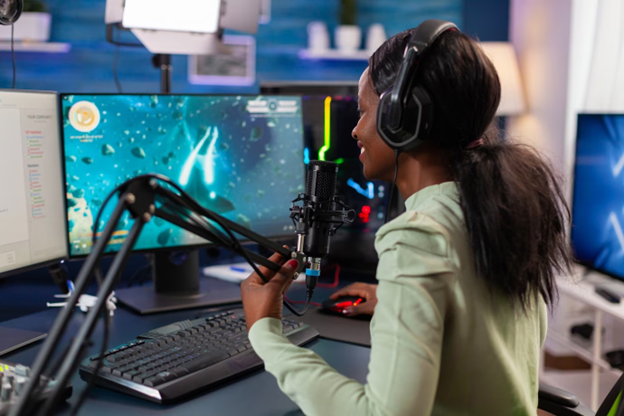
Gender bias is still very much alive in the video game industry, even with the massive steps we have taken in recent years. Women are still underrepresented in games, given fewer opportunities than men, and are facing continuous stereotypes at their workplaces.
Yet still, we move. As gamers, industry leaders, and even as a society as a whole, we not only need to acknowledge the existing issues of gender bias in video games, but we also need to address them actively.
It’s 2023, you’d think we’d have moved past some of the most glaringly incorrect and infuriating stereotypes. Yet here we are. Part of the problem with gender bias in video games is that gamer still perpetuates tropes that are simply not true.
Women Don’t Play Video Games
The idea that video games are dominated by male gamers is, effectively, an outright lie. It’s an idea that just isn’t backed by any credible study. Women make up 48% of gamers in the United States, and the number has been growing since 2006.
Women are gamers, period. They don’t just sit on their commutes playing Candy Crush (not that there’s anything wrong with that), but play all sorts of different games. Whether it’s FIFA, Last of Us, or Red Dead Redemption, you will find many women playing these games.
Okay, But Women Don’t Play Action/RPG Games
Even when people concede that women are gamers, they’ll often still object by claiming that they don’t play male-dominated genres like action or role-playing games.
But there’s one thing to say to that: again, it’s just not true. Research has shown that even in the most stereotypically male genres, over 20% of gamers are women. That’s a large chunk of the total numbers, and you can’t ignore it.
eSports? Yeah Right
There’s this stigma attached to eSports, ‘it’s a guy thing’. The same type of thing you hear when people talk about football or basketball. And when it comes to eSports, that stereotype is very damaging.
Half of all gamers are female, yet only a sparse number of women are involved in professional eSports. According to Natalie Denk, who works at Donau University Krems, stereotypical role patterns are one of the reasons women are staying away.
Frustratingly, not enough women are encouraged to work in video games. In Australia, for example, only 15% of employees in the industry are female. That’s not great.
The problem is pretty deep, unfortunately. Women are often pushed out of STEM subjects early, with subjects like computer science, physics, and mathematics often seen as ‘for the boys’.
We need to fix this societal problem. For example, by empowering more women to seek education in STEM fields. Highlight role models. Encourage girls that show talent or interest from a young age.
In 2021, some distressing news was revealed about Activision Blizzard. The company was sued by the state of California, accusing the company of multiple cases of gender discrimination and sexual harassment. The resultant investigation pointed to a ‘frat boy’ environment, where inappropriate jokes about rape, drunken behavior, and other disturbing behavior were all tolerated.
This isn’t an isolated thing in the video game industry. Riot Games has hundreds of employees walk out in protest about harassment and discrimination. There’s the infamous Gamergate incident, where developer Zoë Quinn was ‘target zero’ and used all the abuse threats from the community to protect other women online.
This isn’t about taking the fun out of the office. Or about being politically correct. It’s simply about enforcing a simple sense of decency within the workplace, where female developers and creators can feel safe, without fear of being sexually harassed. Is that too much to ask?
Over the last few years, women in the video game industry have spoken out about their experiences. What has long been suspected yet brushed under the carpet is a history of manipulative, sexist, and predatory behavior permeating through the entire culture of gaming.
On Twitter, women admitted to being plied with drinks, being pressured at industry events, experiencing gaslighting, and the one we’re all used to being treated as an inferior employee just because of not being a man.
Despite the disturbing nature of these allegations, they’re a step forward. We’re finally beginning to bring the problems to the surface, shocking those who were ignorant of them. Companies are being pushed to overhaul their HR regulations, hire diversity officers, and take steps to make employees feel safe.
These stories are reaching the news and a wider audience. It’s no longer simply accepted as part of the industry or something that can’t be changed. That’s the first step, but there’s a long way to go.